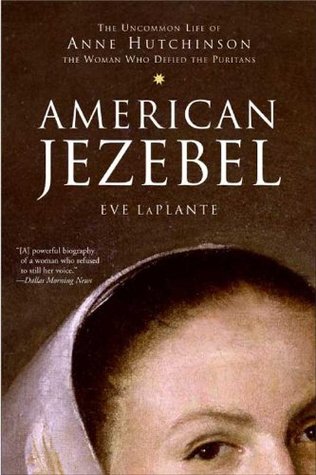More on this book
Community
Kindle Notes & Highlights
by
Eve LaPlante
Read between
August 29 - September 4, 2017
But the banished Reverend Roger Williams, who had settled Providence Plantation two years before, urged them to try Aquidneck Island, which met all their requirements. (Aquidneck was the native name of the island that Europeans, starting with Giovanni da Verrazzano in the early sixteenth century, called Rhode Island, which now contains the towns of Portsmouth, Middletown, and Newport.) Other than Williams’s plantation sixteen miles north by water and the encampment at modern-day Cumberland, Rhode Island, of the solitary Reverend William Blackstone, who had been forced from Beacon Hill in 1634
...more
We whose names are underwritten do solemnly in the presence of Jehovah incorporate ourselves into a body politic and as He shall help, will submit our persons, lives and estates unto our Lord Jesus Christ, the King of Kings, and Lord of Lords, and to all those most perfect and most absolute laws of His given in His Holy Word of truth, to be guided and judged thereby.
These scriptural references and the religious language of the Portsmouth Compact may seem to suggest that these men aimed to create yet another church, to compete with those of Massachusetts, but this was decidedly not their intent. The Rhode Island historian Samuel Arnold explained, regarding the Portsmouth Compact,
So prominent indeed is the religious character of this instrument that it has by some been considered, although erroneously, as being itself “a church covenant, which also embodied a civil compact.” Their plans were more matured than those of the Providence settlers. To establish a colony independent of every other was their avowed intention, and the organization of a regular government was their initial step. That their object was to lay the foundation of a Christian state, where all who bore the name might worship God according to the dictates of conscience, untrammeled by written articles
...more
On March 24, 1638, one day before the start of spring, the eighteen “purchasers of Rhode Island” gave the Narragansett sachems forty fathoms of white wampum beads, ten coats, and twenty hoes as a “gratuity” in exchange for the slender, fifteen-mile-long island of Aquidneck. The marks of Miantonomo, Canonicus and his son, and two other Indians, and the signatures of Randall Holden, the twenty-six-year-old Bostonian who represented the Hutchinsonian men, and the Reverend Roger Williams appear on the land deed. Although the sachems did not share the English settlers’ concept of ownership, they
...more
This highlight has been truncated due to consecutive passage length restrictions.
John Winthrop might persuade himself that God had sealed a covenant with Massachusetts simply by bringing a company of people safely across the Atlantic Ocean. Roger Williams could not. John Winthrop might see the hand of God offering him authority whenever the voters of Massachusetts cast their ballots for him. Roger Williams could not. And when Puritans talked of the divine right of kings or of the people’s holding the powers of government in trust for the Almighty, Williams wanted to see the deed of gift. Where and when and how, he wanted to know, did God transfer His powers to the people
...more
This “Charter of Rhode Island and Providence Plantations,” issued to Williams and the Reverend John Clarke, who had assisted Anne following her miscarriage, guaranteed religious freedom—in keeping with the predilections of its founders. “No person within the said colony, at any time hereafter, shall be any wise molested, punished, disquieted, or called in question, for any differences in opinion in matters of religion, and do not actually disturb the civil peace of our said colony; but that all and every person and persons may…freely and fully have and enjoy his and their own judgments and
...more


